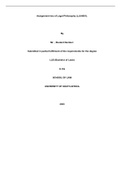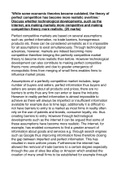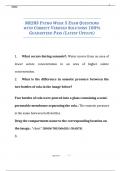Positivism after Hart: Raz
Introduction
In the texts relevant for this lecture, Raz makes (inter alia) the following important contributions:
- Defends critics against positivism such as Dworkin’s at the time
- Puts forward an original conception of authority and its justification.
- Develops a distinct version of legal positivism (‘exclusive’ or ‘hard’ legal positivism) which departs in an
important way from HLA Hart’s version of legal positivism (‘inclusive’ or ‘soft’ legal positivism) – can be
in a sense said to criticise hart’s theory
‘inclusive’ or ‘soft’ legal positivism = a soft positivist believes that while there is no
requirement that any legal system’s rule of recognition require judges to treat moral
considerations as grounds of law, a rule of recognition can incorporate moral criteria, so that
what the law is will depends, with certain respect to certain parts of the law, on moral
considerations.
Hart: ‘the rule of recognition may incorporate as criteria of legal validity conformity
with moral principles or substantive values’)
Note: soft positivist do not claim, as Dworkin does, that judges never have the
discretion to make law; rather, they agree with Dworkin that in some cases the law
may incorporate moral criteria for identifying what the law is
It is important to identify precisely what soft positivism amounts to: the claim is not
simply that judges may be required to decide cases on the basis of moral criteria –
any positivist would allow that. It is how positivists describe what is going on in such
cases which is controversial:
o For s positivist, when a judge decides a case on the basis of moral criteria,
he is making new law – recall Raz’s characterisation of legal principles.
For Raz these principles are the best evidence of the discretion of the
judge to make law, for by directing judges to decide on the basis of
principles, judges are directed to make specific rules covering those cases
which come before them, specific rules which give effect to the general
guidance of the principles in question.
o So the fact that law incorporates moral criteria in its discretions to judge
about how they decide cases is something all positivists can happily
accept.
o The novelty of soft positivism is its acceptance that the rule of
recognition, the rule that identifies what the law is, contains moral
criteria2.
- Offers a novel defence of legal positivism (or, more precisely, of his version of legal positivism) based
on law’s authoritative nature.
- He faces a challenge from philosophical anarchists (philosopher who endorse anarchism, deny
possibility of legitimate authority.
Raz’s conception of authority
- Distinguishing authority and force – although political authorities normally have force at their
disposal, they do more than exercise in force, they claim authority (A normative concept which implies
something bout the way we ought to act). Authority always claim to provide us practical reasons for
actions. It’s part of the very concept of authority that it requires us to do something to be taken as a
reason for action. this is a very important bit for revision.
- Practical reasons is a reason that bares on our actions. It favours a certain action or militates against a
certain action. e.g. the fact it’s raining is a reason to carry an umbrella
- Authoritative requirements constitute ‘pre-emptive reasons’
Contrasting authoritative requirements with the concepts of advice and request
Authority provides us with reasons that are (i) content-independent (i.e. the authoritative
requirement itself, not its content, serves as a reason), and (ii) exclusionary (i.e. excluding
some othe r reasons).
He sometimes frames a similar idea in another term: ‘pre-emption’. Authority provides us
with ‘pre-emptive reasons’ a pre-emptive reason = a combination of (i) an ordinary reason
for action, and (ii) an exclusionary reason, i.e. a reason that excludes from the balance some
reasons against the relevant action.
Introduction
In the texts relevant for this lecture, Raz makes (inter alia) the following important contributions:
- Defends critics against positivism such as Dworkin’s at the time
- Puts forward an original conception of authority and its justification.
- Develops a distinct version of legal positivism (‘exclusive’ or ‘hard’ legal positivism) which departs in an
important way from HLA Hart’s version of legal positivism (‘inclusive’ or ‘soft’ legal positivism) – can be
in a sense said to criticise hart’s theory
‘inclusive’ or ‘soft’ legal positivism = a soft positivist believes that while there is no
requirement that any legal system’s rule of recognition require judges to treat moral
considerations as grounds of law, a rule of recognition can incorporate moral criteria, so that
what the law is will depends, with certain respect to certain parts of the law, on moral
considerations.
Hart: ‘the rule of recognition may incorporate as criteria of legal validity conformity
with moral principles or substantive values’)
Note: soft positivist do not claim, as Dworkin does, that judges never have the
discretion to make law; rather, they agree with Dworkin that in some cases the law
may incorporate moral criteria for identifying what the law is
It is important to identify precisely what soft positivism amounts to: the claim is not
simply that judges may be required to decide cases on the basis of moral criteria –
any positivist would allow that. It is how positivists describe what is going on in such
cases which is controversial:
o For s positivist, when a judge decides a case on the basis of moral criteria,
he is making new law – recall Raz’s characterisation of legal principles.
For Raz these principles are the best evidence of the discretion of the
judge to make law, for by directing judges to decide on the basis of
principles, judges are directed to make specific rules covering those cases
which come before them, specific rules which give effect to the general
guidance of the principles in question.
o So the fact that law incorporates moral criteria in its discretions to judge
about how they decide cases is something all positivists can happily
accept.
o The novelty of soft positivism is its acceptance that the rule of
recognition, the rule that identifies what the law is, contains moral
criteria2.
- Offers a novel defence of legal positivism (or, more precisely, of his version of legal positivism) based
on law’s authoritative nature.
- He faces a challenge from philosophical anarchists (philosopher who endorse anarchism, deny
possibility of legitimate authority.
Raz’s conception of authority
- Distinguishing authority and force – although political authorities normally have force at their
disposal, they do more than exercise in force, they claim authority (A normative concept which implies
something bout the way we ought to act). Authority always claim to provide us practical reasons for
actions. It’s part of the very concept of authority that it requires us to do something to be taken as a
reason for action. this is a very important bit for revision.
- Practical reasons is a reason that bares on our actions. It favours a certain action or militates against a
certain action. e.g. the fact it’s raining is a reason to carry an umbrella
- Authoritative requirements constitute ‘pre-emptive reasons’
Contrasting authoritative requirements with the concepts of advice and request
Authority provides us with reasons that are (i) content-independent (i.e. the authoritative
requirement itself, not its content, serves as a reason), and (ii) exclusionary (i.e. excluding
some othe r reasons).
He sometimes frames a similar idea in another term: ‘pre-emption’. Authority provides us
with ‘pre-emptive reasons’ a pre-emptive reason = a combination of (i) an ordinary reason
for action, and (ii) an exclusionary reason, i.e. a reason that excludes from the balance some
reasons against the relevant action.











